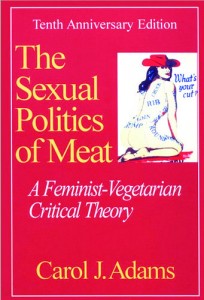Adams devours the concept of the sexualization of animals as women and vice-versa as she describes it in her book “The Sexual Politics of Meat.”
Caitlyn Kuzmich, Staff Writer
Are you against rape culture, sexual harassment and domestic violence? Are you in support of birth control? Are you for equal pay, for equal work? If you answered “yes” to these questions then you hold feminist beliefs. If the answers to these questions seemed obvious, why then are so many young women reluctant to align themselves with the feminist movement? These are among the topics I had the opportunity to discuss with feminist author and activist Carol Adams last week.
SUNY Oneonta had the pleasure of welcoming Adams, a vegan feminist theorist, to campus as the keynote speaker of the 18th Annual SUNY Oneonta Undergraduate Philosophy Conference last Friday night. Adams, an upstate New York native, discussed the roots of her activism and how to make one’s case in an oppositional world. Throughout her lecture, she evaluated the intersections between the mistreatment of women and animals by a male dominated consumer culture. Adams has authored over 19 books including “The Sexual Politics of Meat,” her most controversial work.

When recollecting some of the verbal assaults she received from critics of her book, including Rush Limbaugh’s, Adams joked “If only Limbaugh’s listeners read books,” maintaining a sense of humor throughout the lecture, even in its darker moments. “The Sexual Politics of Meat” has served as a sort of feminist vegan manifesto since its publication in 1990. The book explores the intertwined nature of feminism, animal rights, vegetarianism and literary theory. In “The Sexual Politics of Meat,” Adams highlights inequalities based on sex and species, paralleling the oppression of women and animals. She discusses what it means to write against the dominant culture and described how she came to realize that hate speech against women has been disguised by the politics of meat. She also describes the concept of an “absent referent” which allows meat eaters to eat meat guilt free without acknowledging that what is on their plate was once a living and breathing animal with a perspective of his or her own.
Countering arguments that the feminist movement is something of the past, Adams says “I’ll be a post feminist in a post patriarchy. You can’t be a post feminist if the issues of feminism haven’t been addressed.” It seems the reluctance of young women to embrace the feminist movement can be attributed to societal misrepresentations of feminists as angry, hairy and violently idealistic. (Side note: Women have every right to be angry, idealistic and hairy.) Adams stated that “the dominant culture doesn’t want feminism to succeed. So of course it’s going to create stereotypes of a feminist that are undesirable.” It can be excruciatingly frustrating for feminists to hear young women repeatedly separate themselves from the feminist movement. She added, “Our culture is a very regressive culture. Which means that it’s constantly creating new ways of instituting old beliefs.”
Adams provokes her readers and listeners to challenge our regressive culture. She asks her audience to take notice of advertisements which explicitly sexualize and objectify women and animals for consumption by a male dominated society. Both types of advertisements seem to give the impression that the animal and the woman want to be consumed, raising startling questions on the topic of consent.
When asked how the politics of meat relate to the issue of women’s reproductive rights, Adams replied, “We would not have dairy and eggs if we didn’t manipulate and abuse the female reproductive cycle.” Describing milk and egg production as a type of slavery, she added “It’s kind of like being in a factory line that’s constantly being sped up and the product is from your own body.”
Adams recalled the many times meat-eaters have told her, “You make me feel guilty.” She spoke about how guilt can be a telling and educational thing but guilt alone won’t provoke change. It is the questions we ask ourselves that bring about real change. For all of us who cringe at lectures like Adams’, shrug and eat a burger anyway, perhaps guilt is trying to tell us something. In closing, on Friday night, Adams recognized that people come to consciousness in a number of different ways and encouraged her audience to make an effort to be politically aware (and go vegan!).
Leave a Reply